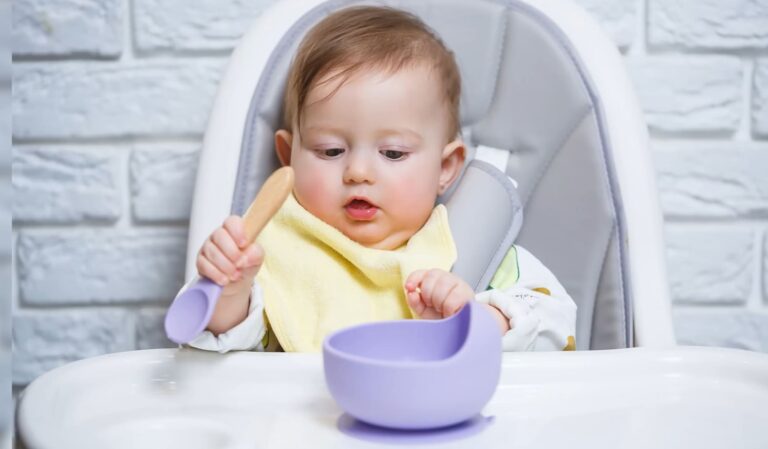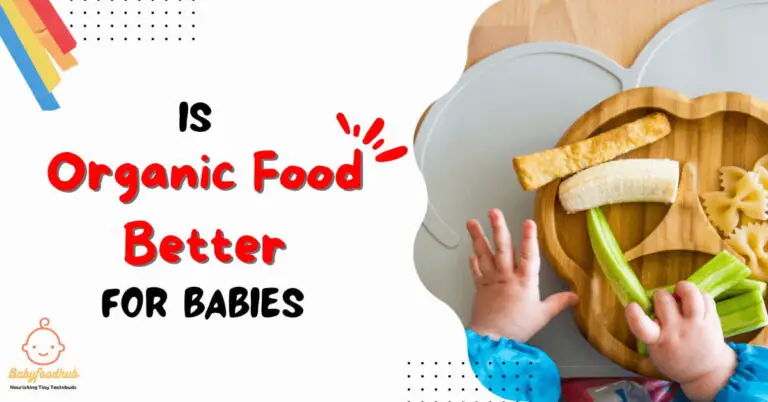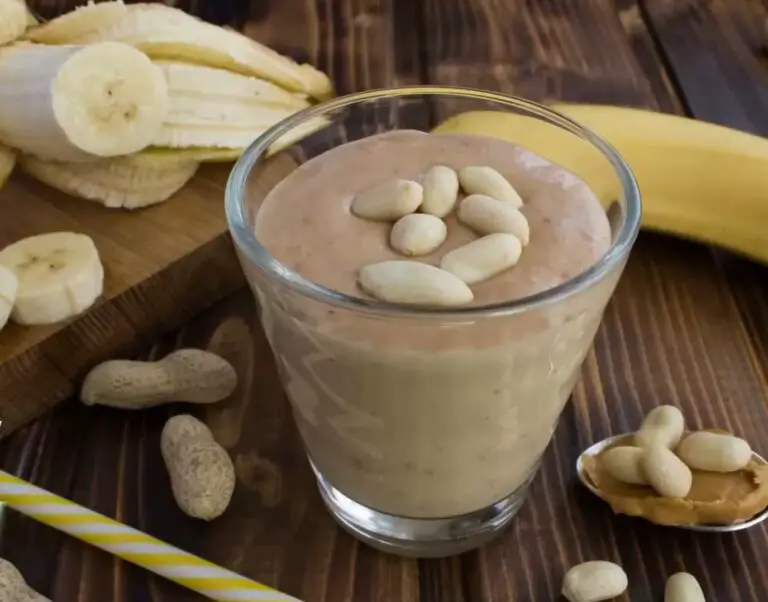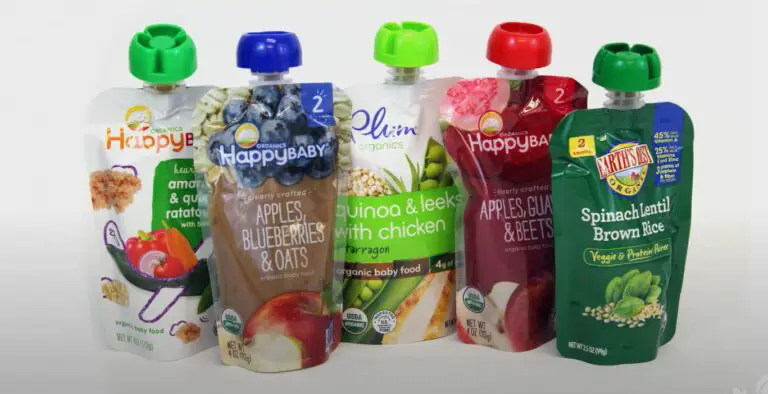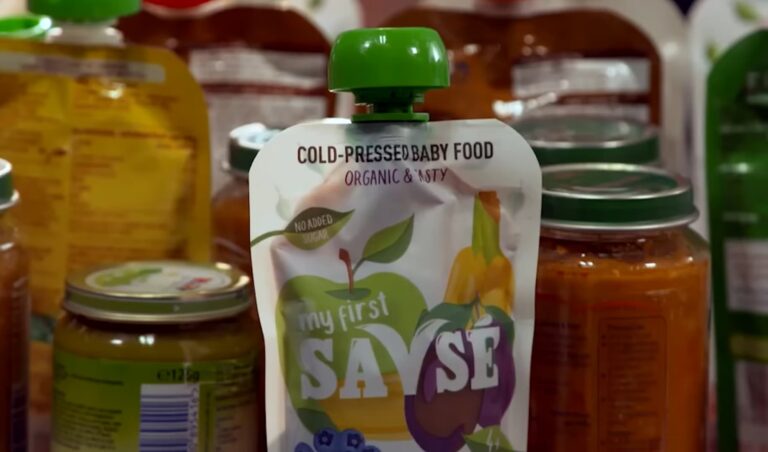Are Food Pouches Good for Babies? Nutritional Breakdown
Food pouches can be convenient for feeding babies on the go, but they may not always be the best option for developing healthy eating habits. Overreliance on them can lead to challenges with solid food textures and self-feeding skills.
Babies’ nutrition is paramount, and how they consume their food plays a significant role in their growth. Food pouches, often filled with purees, provide a manageable way to offer nutrients to little ones. They make mealtime less messy and can offer a variety of flavors and ingredients quickly with minimal fuss, earning approval from busy caregivers.
These pouches are typically designed for easy transport and are often shelf-stable, which enhances their convenience. Despite these advantages, it is essential to balance the use of food pouches with traditional feeding methods to ensure that babies learn to chew, experience different food textures, and develop the motor skills associated with self-feeding. As parents introduce solid foods to their children’s diets, integrating a mix of feeding approaches can contribute to a more well-rounded developmental process.
Food Pouches And Baby Nutrition
As parents navigate the diverse world of baby foods, food pouches have become a noteworthy topic in discussions about infant nutrition and feeding practices. With convenience at their core, these squeezable packages promise to deliver nutrition in a toddler-friendly format. But does the ease of food pouches align with the dietary needs of developing babies? Let’s explore the relationship between food pouches and optimum baby nutrition to understand their role in fostering healthy growth.
Importance Of Nutrition In Early Development
The importance of nutrition during a baby’s early years cannot be overstated. Essential nutrients support critical developmental milestones, including brain development, bone growth, and overall health. The foundation of lifelong eating habits is built during this impressionable phase. Babies require a balanced mix of proteins, fats, carbohydrates, vitamins, and minerals to thrive. Ensuring that food pouches contain the right nutritional balance is crucial for infants as they transition from milk to solid foods.
Food Pouches As A Modern Convenience
In today’s fast-paced world, food pouches offer a quick and convenient feeding solution for busy families. Designed for on-the-go consumption, they are easy to store, transport, and serve. Food pouches often come with a variety of fruits, vegetables, grains, and sometimes proteins, making them an appealing choice for parents looking to introduce new flavors and textures to their baby’s diet.
However, not all food pouches are created equal. It’s essential to scrutinize the ingredients list for added sugars, preservatives, or unnecessary fillers. Parents should look for pouches that boast a high content of natural, organic ingredients and those that closely mimic the nutritional profile of homemade meals. Here are some key points to consider with food pouches:
- Nutrient Density: Select pouches with a high density of nutrients per serving.
- Variety: Choose a range of pouches to expose the baby to different tastes and ensure a diverse nutrient intake.
- Minimal Processing: Opt for less processed options to maximize the retention of nutrients.
- Label Transparency: Pick products with clear, understandable ingredient lists and nutrition information.
Food pouches, when used mindfully, can be part of a balanced diet, complementing traditional spoon-feeding and supporting the child’s nutritional needs. But they should not be the sole source of sustenance. Combining pouches with fresh foods ensures that babies receive the benefits of whole foods, such as fiber and unaltered nutrients, which are crucial for healthy development.
Evaluating Food Pouches For Infants
Parents often find themselves navigating the complex world of infant nutrition, seeking convenient options without compromising on the health benefits. Food pouches have emerged as a modern solution for busy caregivers, but how do they measure up against traditional, homemade meals? Let’s delve into the world of pre-packaged baby food pouches, evaluating their nutritional content and the diversity they bring to a baby’s palate.
Nutritional Content Compared To Homemade Meals
Assessing the nutritional content of baby food pouches is critical to understanding their place in an infant’s diet. Here’s a comparison:
| Aspect | Homemade Meals | Food Pouches |
| Freshness | Prepared with fresh ingredients; no preservatives added. | Might contain preservatives to extend shelf life. |
| Nutrient Preservation | Immediate consumption ensures maximum nutrient retention. | Processing and storage can lead to nutrient degradation. |
| Control over Ingredients | Complete control over ingredient selection and quality. | Limited to the manufacturers’ choice and combinations. |
| Sugar Content | Can be moderated or entirely avoided. | Some contain added sugars or naturally higher sugar content from fruit concentrates. |
| Additives | Free from artificial colors, flavors, and thickening agents. | May contain additives to enhance taste, texture, or color. |
While some commercially available food pouches strive to maintain a high nutritional standard, parents should scrutinize product labels to ensure their selections align with the best possible dietary standards for their infants.
Range Of Flavors And Textures Available
Food pouches are often praised for their variety of flavors and textures, which can be an adventure for a baby’s taste buds. Let’s explore the options they offer:
- Flavor Combinations: These pouches often incorporate a mix of fruits, vegetables, grains, and even proteins, offering combinations that might be complex to replicate at home.
- Texture Variety: From smooth purees to chunkier blends, pouches provide a progression of textures suitable as infants grow and develop feeding skills.
- Exposure to New Tastes: An assortment of exotic and seasonal ingredients can expose babies to an array of tastes not always accessible in homemade meals.
Despite the clear advantages in variety, it’s essential to note that reliance solely on food pouches might lead to potential pitfalls such as overconsumption (due to ease of feeding) and the risk of a baby being less accepting of whole foods. It’s beneficial to strike a balance, utilizing pouches for convenience and diversity while also incorporating fresh, homemade options.
Are Food Pouches Good For Babies’ Development?
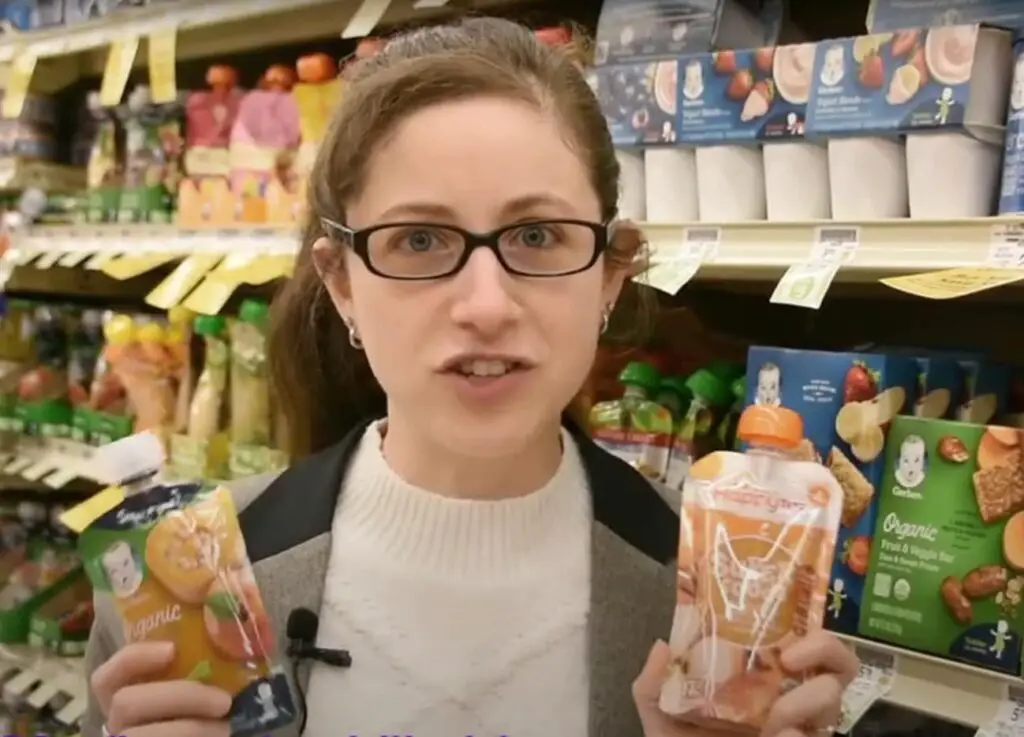
As parents navigate the infant food aisle, the popularity of food pouches continues to grow. These convenient, squeezable packages promise nutrition for little ones and ease for busy caregivers. However, the question arises: Are these food pouches beneficial for babies’ development? Let’s delve into the pros and cons of incorporating food pouches into a baby’s diet and examine their impact on essential motor skills.
Pros And Cons Of Incorporating Pouches In Diet
The use of food pouches in your baby’s diet brings along various advantages and some disadvantages:
- Pros:
- Convenient for on-the-go feeding
- A variety of flavors helps in palate development
- Minimally processed options available
- No need for preparation or clean-up
- Long shelf life and no need for refrigeration
- Cons:
- May be more expensive per serving compared to homemade food
- Overuse can lead to less opportunity to practice chewing
- Reduced exposure to various textures and food forms
- Potential for overeating if babies feed themselves without supervision
- Possibility of developing a preference for smooth, sweet flavors
Impact On Babies’ Chewing And Motor Skills
Understanding the consequences of food pouches on a baby’s chewing and motor skills is essential:
| Chewing Skills | Motor Skills |
| Delayed Development: Relying heavily on pouches can delay the development of chewing skills as babies miss out on the practice that comes with solid foods.Texture Exploration: Babies need to experience various textures to develop a healthy relationship with food and to learn how to manage different food types. | Utensil Use: Spoon-fed or self-fed whole foods encourage babies to develop the use of utensils and fine motor control.Hand-Eye Coordination: Picking up pieces of food and self-feeding foster better hand-eye coordination compared to squeezing a pouch. |
While pouches can be part of a balanced diet, it’s essential to ensure that babies still experience a variety of textures and practice chewing skills. Furthermore, incorporating opportunities for babies to self-feed with different foods is key for the development of essential motor skills and fostering healthy eating habits.
Navigating The World Of Baby Food Choices
Entering the realm of baby nutrition opens up a spectrum of choices for parents. Each decision carries the weight of your baby’s developmental needs. Among the myriad of options, food pouches have emerged as a modern staple in the landscape of infant diets. Let’s plunge into the world of baby food pouches and traditional forms, examining which best supports the journey of growth.
Comparing Traditional Baby Food Forms With Pouches
Traditional baby food often comes in glass jars or plastic tubs and has been a longstanding choice for parents. But food pouches have revolutionized the way we think about feeding our little ones. Here’s a comparison:
| Aspect | Traditional Baby Food | Food Pouches |
| Portability | Less convenient, requires spoon-feeding | Highly portable, ideal for on-the-go feeding |
| Storage | Bulky, risk of breakage | Compact, durable packaging |
| Variety | Limited blends | Wide range of flavors and textures |
| Waste | Recyclable materials, possible waste if not finished | Squeezable to the last drop, minimal waste |
Food pouches offer convenience and variety, but it’s also vital to balance convenience with nutritional value and safety considerations such as ensuring babies still learn to eat from a spoon and preventing excessive consumption straight from the pouch.
How To Select The Best Food Products For Your Child
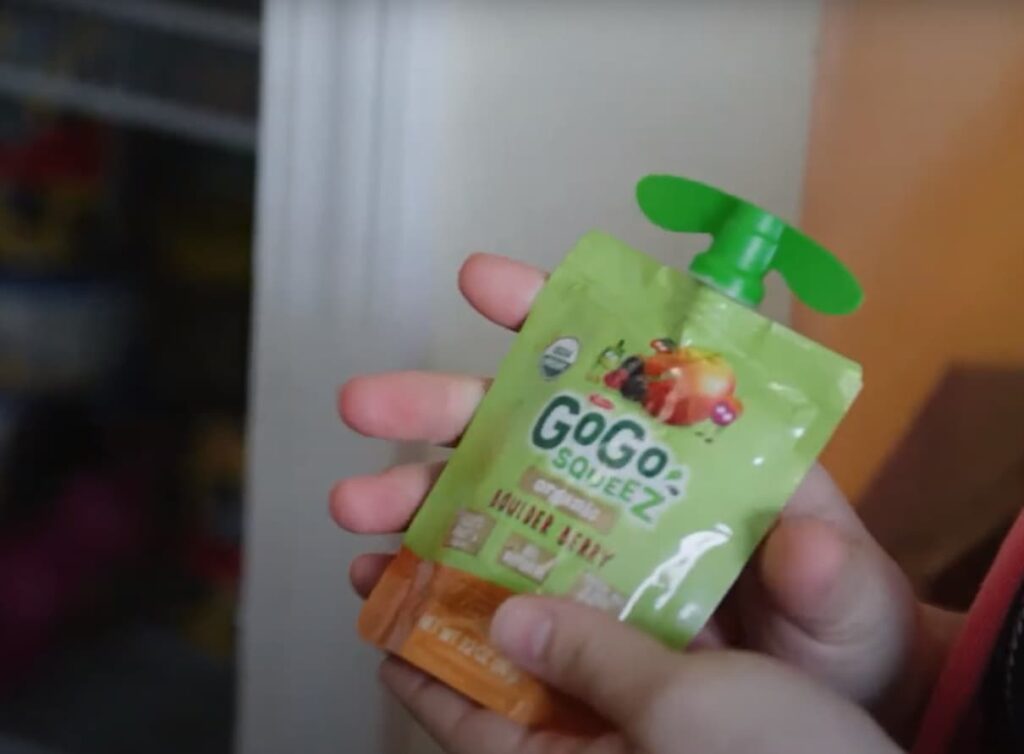
Selecting the right food for your child involves more than picking the most attractive package off the shelf. Here are some critical factors to consider:
- Nutrient Density: Choose options rich in vitamins, minerals, and essential fatty acids.
- Minimal Processing: Look for foods with few ingredients and without added sugars or salts.
- Organic Ingredients: Whenever possible, opt for organic to reduce exposure to pesticides.
- Age Appropriateness: Ensure textures and ingredients are suitable for your baby’s developmental stage.
- Allergy Awareness: Be mindful of potential allergens and introduce new foods one at a time.
Scrutinize labels for ingredient lists and nutritional facts. Feeding choices should align with health recommendations and pediatric advice. Keep in mind, that whether you choose traditional baby food or modern pouch options, diversity and balanced nutrition are paramount.
Understanding The Convenience Factor
Baby food pouches have revolutionized mealtime for little ones with a blend of nutrition and convenience that appeals to busy parents everywhere. These squeezable, portable packets promise to make feeding time a breeze. Whether it’s a rush in the morning, in transit during errands, or dealing with the hustle and bustle of everyday life, food pouches seem like the perfect solution to simplify the feeding process.
Role In Easing Parental Stress And Time Management
Pre-packaged baby food pouches play a huge role in reducing the daily stress parents face. Here’s how they tick all the boxes for a stress-free mealtime:
- No preparation time: Grab-and-go simplicity means no peeling, chopping, or cooking required. Ideal for days packed with activities.
- Mess-free: Minimizes clean-up time. No more spills and splatters!
- Easy storage: Pouches fit effortlessly into diaper bags, purses, or car compartments.
- Self-feeding: Encourages independence as older babies can hold and squeeze their own food.
Moreover, in a world where multitasking has become the norm, these food pouches are a time management asset for parents. They allow parents to quickly serve a meal without pausing their endless to-do lists, be it answering emails or tidying up the house.
Possible Over-reliance On Pre-packaged Solutions
Despite the obvious perks, there’s a brewing concern about the over-reliance on these pre-packaged pouches. Excessive use could entail some disadvantages, such as:
| Issue | Description |
| Variety: | Limited exposure to different textures and tastes compared to whole foods. |
| Nutrition: | Some pouches may lack the nutrients found in fresh, home-cooked meals. |
| Oral Development: | Overuse may affect chewing skills, as sucking doesn’t build the same muscles. |
| Eating Habits: | This could potentially lead to picky eating patterns later on. |
It’s all about balance. Parents should aim to complement pouches with whole foods to ensure their baby develops a healthy relationship with a variety of foods.
Safety Concerns With Baby Food Pouches
No doubt, baby food pouches offer modern parents the epitome of convenience: portable, easy to use, and a quick solution to satisfy a hungry baby anytime, anywhere. Yet, amidst their popularity, safety concerns surface as a poignant discussion point. It’s crucial to understand the potential risks as well as the industry’s efforts in ensuring the safety and quality of these products.
Potential Risks And Safety Measures
Parents prioritize the well-being of their little ones, especially when it comes to nutrition and food intake. Here are some of the potential risks associated with baby food pouches:
- Choking Hazard: The caps of pouches can pose a choking risk if not supervised. Always monitor your baby while they eat and ensure the cap is out of their reach.
- Overeating: Pouches can lead to overeating as babies might find it hard to recognize fullness when sucking purées. Moderate portion sizes to encourage healthy eating habits.
- Dental Issues: Frequent sucking on pouch spouts may affect a child’s oral development or lead to tooth decay. Limited use and proper dental care can mitigate these risks.
- Nutrient Deficiency: Reliance on pouches can prevent exposure to varied textures and types of foods, possibly influencing nutrient variety. Introduce a balance of foods to promote comprehensive nutrition.
To minimize these risks, here’s a list of safety measures parents and caregivers can follow:
- Supervision: Never leave a baby unattended while they are eating from a food pouch.
- Educational Feeding: Use pouches as part of a wider diet that includes finger foods and family meals to teach about different food textures and tastes.
- Oral Hygiene: Clean your baby’s teeth after feeding, especially if they have had pouches containing fruit purées.
- Diverse Diet: Ensure that pouches complement a varied diet, not replace it.
Producers are also compelled to perform regular quality tests for potential contaminants such as heavy metals, to ensure baby food pouch contents are within safe consumption levels. Detailed labeling regulations provide transparency about ingredients, nutritional content, and any potential allergens within the products. It is crucial that parents stay informed and routinely inspect package labels to select the best options for their infants.
Integrating Food Pouches Into A Balanced Diet
The introduction of food pouches has revolutionized the way parents feed their babies. These portable and convenient packets can be a lifesaver for on-the-go meals. Yet, it’s essential to consider how food pouches can fit into a baby’s balanced diet. Harmonizing the ease of these products with a baby’s nutritional needs can pave the way for healthy eating habits. Let’s explore some strategies.
Guidelines For Healthful Use Of Baby Food Pouches
- Monitor Frequency: Use pouches as a complement to meals rather than a replacement. Limit to one pouch per day to encourage a variety of foods.
- Practice with Utensils: Combine pouch feeding with traditional spoon-feeding to develop motor skills.
- Read Labels: Opt for pouches with no added sugars or preservatives—nutritional authenticity is key.
- Interact During Meals: Encourage eye contact and communication to foster a bonding mealtime experience.
Ensuring Variety And Completeness In Baby’s Diet
| Food Group | Examples |
| Fruits & Vegetables | Pureed apples, avocados, spinach, sweet potatoes |
| Proteins | Pureed beans, lentils, soft-cooked chicken |
| Grains | Rice, oatmeal, soft-cooked pasta |
| Dairy | Yogurt, cheese (as appropriate) |
Introduce a rainbow of colors through various fruits and vegetables to ensure a range of nutrients. Rotate between different protein sources and grains to provide a well-rounded diet. Remember, while food pouches offer convenience and variety, they should complement a diet rich in whole, unprocessed foods. Establishing these eating patterns early sets the stage for a lifetime of healthy food choices.
Frequently Asked Questions Are Food Pouches Good For Babies?
Are Baby Food Pouches OK for Babies?
Baby food pouches are generally safe for babies, offering convenience and a variety of flavors. Always ensure quality and consider pouch use alongside other feeding methods for a balanced diet.
When Should Babies Start Eating Pouches?
Babies can typically start eating pureed food pouches around 4 to 6 months old, after they show readiness for solids. Always consult with a pediatrician before introducing new foods to your baby’s diet.
Why Are Baby Food Pouches Only Good For 24 Hours?
Baby food pouches, once opened, last 24 hours due to potential bacterial growth and nutrient degradation, ensuring safety and freshness.
What Is An Alternative To Baby Food Pouches?
Homemade baby food is a great alternative to store-bought baby food pouches. Use fresh ingredients to prepare purees or mashed foods.
Are Food Pouches Safe For Infants?
Food pouches are generally safe for infants when they meet safety standards for packaging and contain age-appropriate, healthy ingredients. Always check for recalls and food safety alerts.
Conclusion
In assessing the value of food pouches for babies, striking a balance is key. They offer convenience and variety, enticing for busy caregivers. Yet, it’s vital to complement them with whole foods, ensuring diverse texture experiences. Optimal infant nutrition involves a mix of pouches and traditional feeding approaches.
Parents, as always, should consult with pediatricians to tailor the best dietary path for their children.


